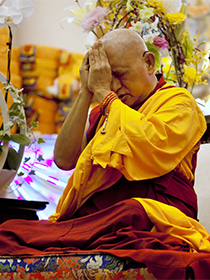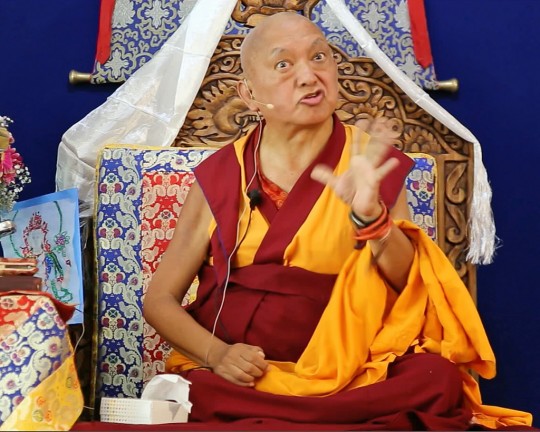- Home
- FPMT Homepage
Foundation for the Preservation of the Mahayana Tradition
The FPMT is an organization devoted to preserving and spreading Mahayana Buddhism worldwide by creating opportunities to listen, reflect, meditate, practice and actualize the unmistaken teachings of the Buddha and based on that experience spreading the Dharma to sentient beings. We provide integrated education through which people’s minds and hearts can be transformed into their highest potential for the benefit of others, inspired by an attitude of universal responsibility and service. We are committed to creating harmonious environments and helping all beings develop their full potential of infinite wisdom and compassion. Our organization is based on the Buddhist tradition of Lama Tsongkhapa of Tibet as taught to us by our founders Lama Thubten Yeshe and Lama Thubten Zopa Rinpoche.
- Willkommen
Die Stiftung zur Erhaltung der Mahayana Tradition (FPMT) ist eine Organisation, die sich weltweit für die Erhaltung und Verbreitung des Mahayana-Buddhismus einsetzt, indem sie Möglichkeiten schafft, den makellosen Lehren des Buddha zuzuhören, über sie zur reflektieren und zu meditieren und auf der Grundlage dieser Erfahrung das Dharma unter den Lebewesen zu verbreiten.
Wir bieten integrierte Schulungswege an, durch denen der Geist und das Herz der Menschen in ihr höchstes Potential verwandelt werden zum Wohl der anderen – inspiriert durch eine Haltung der universellen Verantwortung und dem Wunsch zu dienen. Wir haben uns verpflichtet, harmonische Umgebungen zu schaffen und allen Wesen zu helfen, ihr volles Potenzial unendlicher Weisheit und grenzenlosen Mitgefühls zu verwirklichen.
Unsere Organisation basiert auf der buddhistischen Tradition von Lama Tsongkhapa von Tibet, so wie sie uns von unseren Gründern Lama Thubten Yeshe und Lama Thubten Zopa Rinpoche gelehrt wird.
- Bienvenidos
La Fundación para la preservación de la tradición Mahayana (FPMT) es una organización que se dedica a preservar y difundir el budismo Mahayana en todo el mundo, creando oportunidades para escuchar, reflexionar, meditar, practicar y actualizar las enseñanzas inconfundibles de Buda y en base a esa experiencia difundir el Dharma a los seres.
Proporcionamos una educación integrada a través de la cual las mentes y los corazones de las personas se pueden transformar en su mayor potencial para el beneficio de los demás, inspirados por una actitud de responsabilidad y servicio universales. Estamos comprometidos a crear ambientes armoniosos y ayudar a todos los seres a desarrollar todo su potencial de infinita sabiduría y compasión.
Nuestra organización se basa en la tradición budista de Lama Tsongkhapa del Tíbet como nos lo enseñaron nuestros fundadores Lama Thubten Yeshe y Lama Zopa Rinpoche.
A continuación puede ver una lista de los centros y sus páginas web en su lengua preferida.
- Bienvenue
L’organisation de la FPMT a pour vocation la préservation et la diffusion du bouddhisme du mahayana dans le monde entier. Elle offre l’opportunité d’écouter, de réfléchir, de méditer, de pratiquer et de réaliser les enseignements excellents du Bouddha, pour ensuite transmettre le Dharma à tous les êtres. Nous proposons une formation intégrée grâce à laquelle le cœur et l’esprit de chacun peuvent accomplir leur potentiel le plus élevé pour le bien d’autrui, inspirés par le sens du service et une responsabilité universelle. Nous nous engageons à créer un environnement harmonieux et à aider tous les êtres à épanouir leur potentiel illimité de compassion et de sagesse. Notre organisation s’appuie sur la tradition guéloukpa de Lama Tsongkhapa du Tibet, telle qu’elle a été enseignée par nos fondateurs Lama Thoubtèn Yéshé et Lama Zopa Rinpoché.
Visitez le site de notre Editions Mahayana pour les traductions, conseils et nouvelles du Bureau international en français.
Voici une liste de centres et de leurs sites dans votre langue préférée
- Benvenuto
L’FPMT è un organizzazione il cui scopo è preservare e diffondere il Buddhismo Mahayana nel mondo, creando occasioni di ascolto, riflessione, meditazione e pratica dei perfetti insegnamenti del Buddha, al fine di attualizzare e diffondere il Dharma fra tutti gli esseri senzienti.
Offriamo un’educazione integrata, che può trasformare la mente e i cuori delle persone nel loro massimo potenziale, per il beneficio di tutti gli esseri, ispirati da un’attitudine di responsabilità universale e di servizio.
Il nostro obiettivo è quello di creare contesti armoniosi e aiutare tutti gli esseri a sviluppare in modo completo le proprie potenzialità di infinita saggezza e compassione.
La nostra organizzazione si basa sulla tradizione buddhista di Lama Tsongkhapa del Tibet, così come ci è stata insegnata dai nostri fondatori Lama Thubten Yeshe e Lama Zopa Rinpoche.
Di seguito potete trovare un elenco dei centri e dei loro siti nella lingua da voi prescelta.
- 欢迎 / 歡迎
简体中文
“护持大乘法脉基金会”( 英文简称:FPMT。全名:Foundation for the Preservation of the Mahayana Tradition) 是一个致力于护持和弘扬大乘佛法的国际佛教组织。我们提供听闻,思维,禅修,修行和实证佛陀无误教法的机会,以便让一切众生都能够享受佛法的指引和滋润。
我们全力创造和谐融洽的环境, 为人们提供解行并重的完整佛法教育,以便启发内在的环宇悲心及责任心,并开发内心所蕴藏的巨大潜能 — 无限的智慧与悲心 — 以便利益和服务一切有情。
FPMT的创办人是图腾耶喜喇嘛和喇嘛梭巴仁波切。我们所修习的是由两位上师所教导的,西藏喀巴大师的佛法传承。
繁體中文
護持大乘法脈基金會”( 英文簡稱:FPMT。全名:Found
ation for the Preservation of the Mahayana Tradition ) 是一個致力於護持和弘揚大乘佛法的國際佛教組織。我們提供聽聞, 思維,禪修,修行和實證佛陀無誤教法的機會,以便讓一切眾生都能 夠享受佛法的指引和滋潤。 我們全力創造和諧融洽的環境,
為人們提供解行並重的完整佛法教育,以便啟發內在的環宇悲心及責 任心,並開發內心所蘊藏的巨大潛能 — 無限的智慧與悲心 – – 以便利益和服務一切有情。 FPMT的創辦人是圖騰耶喜喇嘛和喇嘛梭巴仁波切。
我們所修習的是由兩位上師所教導的,西藏喀巴大師的佛法傳承。 察看道场信息:
- FPMT Homepage
- News/Media
-
- Study & Practice
-
-
- About FPMT Education Services
- Latest News
- Programs
- New to Buddhism?
- Buddhist Mind Science: Activating Your Potential
- Heart Advice for Death and Dying
- Discovering Buddhism
- Living in the Path
- Exploring Buddhism
- FPMT Basic Program
- FPMT Masters Program
- FPMT In-Depth Meditation Training
- Maitripa College
- Lotsawa Rinchen Zangpo Translator Program
- Universal Education for Compassion & Wisdom
- Online Learning Center
-
- Prayers & Practice Materials
- Overview of Prayers & Practices
- Full Catalogue of Prayers & Practice Materials
- Explore Popular Topics
- Benefiting Animals
- Chenrezig Resources
- Death & Dying Resources
- Lama Chopa (Guru Puja)
- Lama Zopa Rinpoche: Compendium of Precious Instructions
- Lama Zopa Rinpoche: Life Practice Advice
- Lama Zopa Rinpoche Practice Series
- Lamrim Resources
- Mantras
- Prayer Book Updates
- Purification Practices
- Sutras
- Thought Transformation (Lojong)
- Audio Materials
- Dharma Dates - Tibetan Calendar
- Translation Services
- Publishing Services
- Ways to Offer Support
- Prayers & Practice Materials
-
- Teachings and Advice
- Find Teachings and Advice
- Lama Zopa Rinpoche Advice Page
- Lama Zopa Rinpoche: Compendium of Precious Instructions
- Lama Zopa Rinpoche Video Teachings
- ༧སྐྱབས་རྗེ་བཟོད་པ་རིན་པོ་ཆེ་མཆོག་ནས་སྩལ་བའི་བཀའ་སློབ་བརྙན་འཕྲིན།
- Podcasts
- Lama Yeshe Wisdom Archive
- Buddhism FAQ
- Dharma for Young People
- Resources on Holy Objects
- Teachings and Advice
-
-
*If a menu item has a submenu clicking once will expand the menu clicking twice will open the page.
-
-
- Centers
-
- Teachers
-
- Projects
-
-
-
-
*If a menu item has a submenu clicking once will expand the menu clicking twice will open the page.
-
-
- FPMT
-
-
-
-
-
Tibetan Buddhism teaches you to overcome your dissatisfied mind, but to do that you have to make an effort. To put our techniques into your own experience, you have to go slowly, gradually. You can’t just jump right in the deep end. It takes time and we expect you to have trouble at first. But if you take it easy it gets less and less difficult as time goes by.
Lama Zopa Rinpoche
-
-
-
- Shop
-
-
-
The Foundation Store is FPMT’s online shop and features a vast selection of Buddhist study and practice materials written or recommended by our lineage gurus. These items include homestudy programs, prayers and practices in PDF or eBook format, materials for children, and other resources to support practitioners.
Items displayed in the shop are made available for Dharma practice and educational purposes, and never for the purpose of profiting from their sale. Please read FPMT Foundation Store Policy Regarding Dharma Items for more information.
-
-
Lama Zopa Rinpoche News and Advice
9
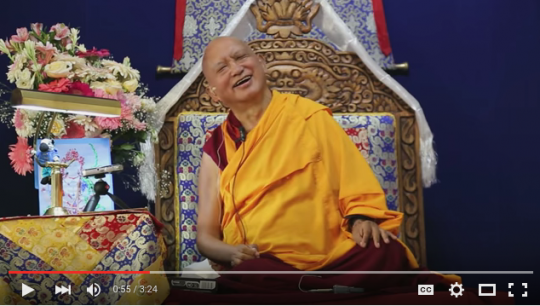
Screenshot from “The Real Smell of a Fart”
“When you smell a fart it seems to be real from its own side,” Lama Zopa Rinpoche teaches in a new video on FPMT’s YouTube channel. “But what actually exists is only what is merely imputed by the mind. However, it appears to us as the real smell of a fart. Do you understand? In reality it is what is merely imputed by the mind. I gave the example of the smell of a fart as something that we think of as real, but it is the same for the real I – all these are totally false. We are living our life in a totally false world.”
Watch “The Real Smell of a Fart” on YouTube:
https://www.youtube.com/watch?v=QlgeIBsmzr0
You can watch more video clips of Lama Zopa Rinpoche on FPMT’s YouTube page: http://bit.ly/fpmt-youtube
For longer videos of Rinpoche teaching, visit: http://bit.ly/rinpoche-available-now
Learn more about Lama Zopa Rinpoche, spiritual director of the Foundation for the Preservation of Mahayana Tradition (FPMT), and Rinpoche’s vision for a better world. Sign up to receive news and updates.
- Tagged: fart, lama zopa rinpoche, video, youtube
- 0
8
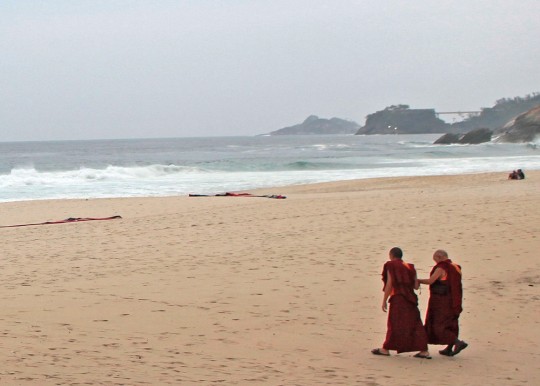
Lama Zopa Rinpoche on the beach in Rio de Janeiro, Brazil, September 2015. Photo by Ven. Lobsang Sherab.
From “Lama Zopa Rinpoche’s Online Advice Book” on the Lama Yeshe Wisdom Archive:
A student wrote to Lama Zopa Rinpoche about her negative, critical mind, which had become worse after attending lam-rim teachings and a retreat. She found Dharma practice difficult, because her mind was restless and there was no inner feeling for the words she read. She felt distant from the Dharma and Rinpoche, and was worried about losing contact, trust and faith. Rinpoche advised the following.
My dear A—,
You should go to the beach quite often and walk on the sand at the side of the ocean or walk beside a river. Just relax and enjoy. The beach will help to distract your mind and help you not to think of your problems. Enjoy the sunshine, the water and all that. It will make you more relaxed. I will pray for you.
With much love and prayer…
You can find more advice from Lama Zopa Rinpoche on the Lama Yeshe Wisdom Archive:
https://lamayeshe.com/advice/lama-zopa-rinpoches-online-advice-book
More information, photos and updates about FPMT spiritual director Lama Zopa Rinpoche can be found on Rinpoche’s webpage. If you’d like to receive news of Lama Zopa Rinpoche and FPMT via email, sign up to FPMT News.
- Tagged: lama zopa rinpoche
- 0
7
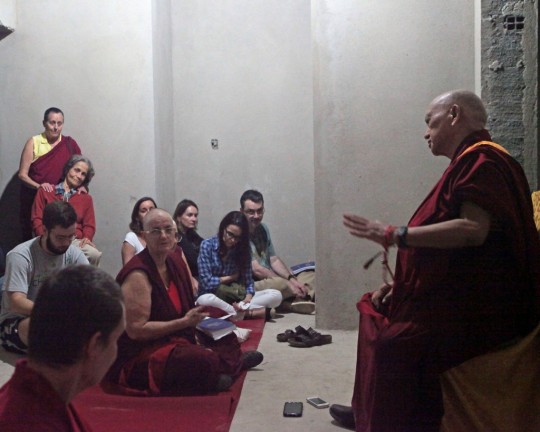
Lama Zopa Rinpoche blessing the building bought by Centro Shiwa Lha to become the center’s new home, Rio de Janeiro, Brazil, September 2015. Photo by Ven. Lobsang Sherab.
“I’m going to mention briefly how the Dharma center is so important. We can see more and more how much of an emergency it is to have such a center, because this is where we can learn the whole path to liberation, the unmistaken path to happiness, the unmistaken cause of happiness. Not only that, the unmistaken cause for the path to liberation; and not only that, the unmistaken cause for the path to great liberation, full enlightenment, how to be free from suffering; to understand the cause of suffering and how to get rid of that. This is never explained or taught in schools, colleges and universities,” Lama Zopa Rinpoche wrote in a letter to Maitreya Instituut on the occasion of celebrating its tenth anniversary in 2008.
“These things are missing in the education facilities in the world. The most important teaching is missing, the most practical thing – the education of a good heart, compassion.
“Why is there so much killing and war even among religious people? It is because of the lack of this practice, this education. So practicing the good heart develops from this education, this practice.
“If we guard our mind then we don’t need guns. We don’t harm others and in this way we don’t receive harm back from others – shooting, atomic bombs, whatever. We don’t receive all this harm. This education is not brought up in schools and colleges, even though it is the most important thing for world peace.
“So what can bring peace and happiness to the world generally, to all different religions? It is compassion, loving kindness. This is the only answer for world peace. For young and for old, to bring peace and unity among religions, there is one thing – compassion, the good heart. …”
Read the entire letter from Rinpoche “Tenth Anniversary Message” on the Lama Yeshe Wisdom Archive: https://lamayeshe.com/advice/benefits-dharma-centers/.

The future home of Centro Shiwa Lha, recently bought by the center and currently under renovation, Rio de Janeiro, Brazil, September 2015. Photo by Ven. Roger Kunsang.
Lama Zopa Rinpoche is the spiritual director of the Foundation for the Preservation of Mahayana Tradition (FPMT), a Tibetan Buddhist organization dedicated to the transmission of the Mahayana Buddhist tradition and values worldwide through teaching, meditation and community service.
“You may have heard the story about Drukhang Rinpoche, whose cave [was] just above Sera College,” Lama Zopa Rinpoche said during a teaching on refuge given in Dharamsala in 1986. “He had one guru from whom he had learned the alphabet but he did not visualize him in the merit field because he saw him as being full of mistakes. For many years he meditated on lam-rim but no realizations came. So he went to ask his root guru for advice. His guru asked him, ‘Did you leave out any gurus in your visualization of the merit field? Go back and check.’ He returned to his place of meditation and counted all the gurus and found that his alphabet teacher was missing. He went back to tell his guru, who advised him, ‘You have had no attainment so far because that guru from whom you learned the alphabet was missing. Now you should meditate on that one as the principal being of the merit field.’
“I have heard different versions of this advice, one that he should be visualized as being the embodiment of Guru Shakyamuni Buddha, the principal being of the merit field, another that he should be visualized on the crown of Guru Shakyamuni Buddha. Immediately, he did this meditation; realizations came so easily, like rainfall. Je Drukhangpa’s biography relating how he practiced lam-rim is unbelievable. It is so interesting, and so inspiring, especially how he practiced bodhichitta. One can understand the importance of having to develop devotion towards all of one’s gurus from that story.”
From “Refuge in the Three Jewels” published on the Lama Yeshe Wisdom Archive:
https://lamayeshe.com/article/chapter/refuge-three-jewels
Learn more about Lama Zopa Rinpoche, spiritual director of the Foundation for the Preservation of Mahayana Tradition (FPMT), and Rinpoche’s vision for a better world. Sign up to receive news and updates.
- Tagged: lama zopa rinpoche, refuge
- 0
2
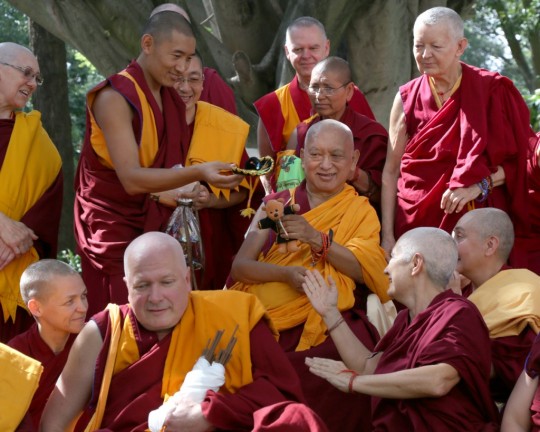
Lama Zopa Rinpoche holding Teddy Tulku during a group photo with Sangha at the end of the lam-rim retreat in Mexico, September 2015. Photo by Ven. Thubten Kunsang.
“Cherishing others is the door opening, opening the door for all the qualities, infinite qualities. Cherishing oneself is opening the door for all the problems, obstacles, for all these qualities, obstacle for all these qualities that we are talking about, all these desirable objects, obstacles, opening the door for problems, opening the door for all the obstacles.”
– Lama Zopa Rinpoche, from “The Benefits of Purification Practice” on Lama Yeshe Wisdom Archive (lamayeshe.com), Jinsiu Farlin Center, Taipei, Taiwan, 1994
More information, photos and updates about FPMT spiritual director Lama Zopa Rinpoche can be found on Rinpoche’s webpage. If you’d like to receive news of Lama Zopa Rinpoche and FPMT via email, sign up to FPMT News.
- Tagged: lama yeshe wisdom archive, lama zopa rinpoche
- 0
1
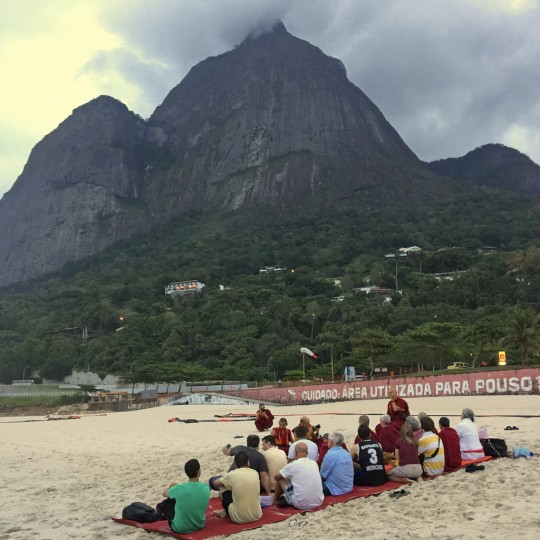
Lama Zopa Rinpoche with students from Centro Shiwa Lha blessing the ocean and all the creatures in it, Rio de Janeiro, Brazil, September 2015. Photo by Ven. Roger Kunsang.
As Lama Zopa Rinpoche travels around the globe, he regularly finds time in this busy schedule to go to beaches, piers and even ferry boats to bless the ocean and all the sentient beings living in it. One time in California, Rinpoche and a large group of students were asked to leave a wharf where they were blessing the beings using a special Namgyalma mantra boards because they didn’t have the required permission. The next day, Rinpoche wrote a letter:
“Just as the fisher people get permission, we also request the state parks for this permission. Within this great democratic country, which gives so much happiness to others, please grant permission to bless the ocean and liberate all the animals and fish in the ocean, to free them from the suffering of rebirth, old age, sickness and death, and to help them achieve total liberation from suffering and attain the state of omniscient mind, the peerless happiness.”
For more see “Permission to Bless Sentient Beings in the Ocean” on the Lama Yeshe Wisdom Archive and FPMT.org stories on the Namgyalma mantra and blessing animals.
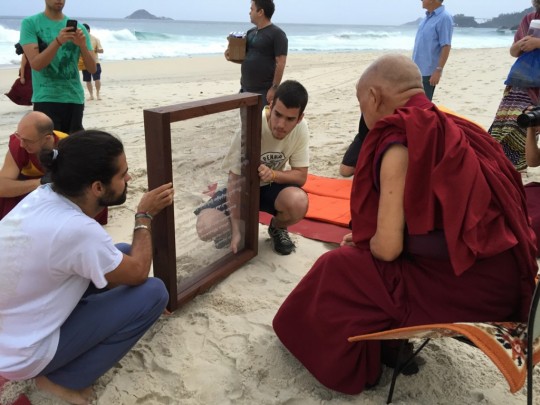
Lama Zopa Rinpoche checking the Namgyalma mantra on the newly made board for blessing beings in the ocean, Rio de Janeiro, Brazil, September 2015. Photo by Ven. Roger Kunsang.
Learn more about Lama Zopa Rinpoche, spiritual director of the Foundation for the Preservation of Mahayana Tradition (FPMT), and Rinpoche’s vision for a better world. Sign up to receive news and updates.
- Tagged: animals, brazil, centro shiwa lha, lama zopa rinpoche, namgyalma mantra
- 0
30
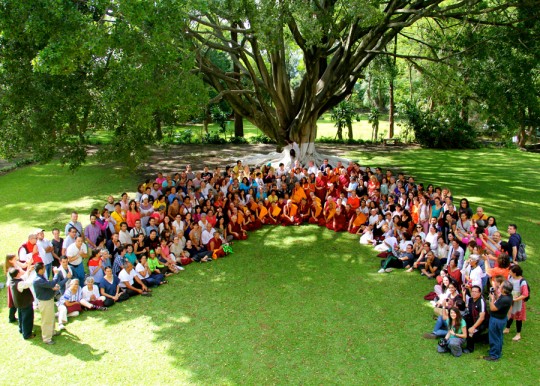
Lama Zopa Rinpoche with participants in the Mexican retreat, Guadalajara, Mexico, September 2015. Photo by Drolkar McCallum.
Karla Ambrosio, national coordinator of FPMT Mexico, shares this report after Lama Zopa Rinpoche’s recent retreat to the country in September 2015. The retreat was called “Essential Nectar” and took place at Casa de Ejercicios Espirituales de Puente Grande, a Jesuit retreat center just outside of Guadalajara:
The root text for the retreat was the poem written by Yeshe Tsöndru, a 19th-century Gelug lama from Sera Me Monastery. During the eight-day retreat, Rinpoche taught lam-rim, showing how we might see life’s great value and, by taking up the profound practice based on bodhichitta and emptiness, make it most beneficial.
As Rinpoche did in his last visit in 2008, the retreat began with detailed teachings on the nature of reality and continued with the three aspects of the path and heart advice on guru devotion. During the retreat, Rinpoche emphasized the importance of purification, collecting merit and develop a good heart.
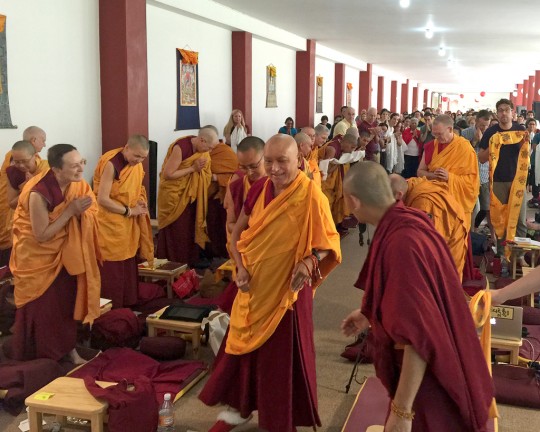
Lama Zopa Rinpoche arriving at the beginning of a teaching session during the lam-rim retreat in Mexico, September 2015. Photo by Ven. Roger Kunsang.
About 300 people attended the retreat and around 20 people took refuge with Lama Zopa Rinpoche on the last evening. FPMT Mexico hosted and organized the retreat with Centro Khamlungpa, which offered heartfelt service through 30 volunteers. Most remarkable is the great organization job done by Dunia Cárcamo and Ramón Lara from Centro Khamlungpa, as well as Ven. Paloma Alba, whose great experience and service as FPMT Latin America regional coordinator is priceless.
The event was especially meaningful because of the diversity of the attendees: new Dharma students from different Tibetan Buddhist traditions and schools within Mexico; FPMT center directors, study group coordinators, SPCs, board members and students from all over the country; visitors from North and Latin America; Sangha members – and even three babies still in the womb!
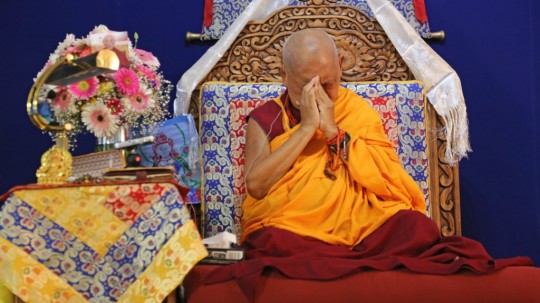
Lama Zopa Rinpoche on the teaching throne during the lam-rim retreat, Guadalajara, Mexico, September 2015. Photo by Ven. Thubten Kunsang.
Some of the elder students expressed several times that the retreat had been one of the best, mostly because of the warm feeling of the Mexican people and the truly heartfelt service offered by the volunteers. Such an amazing opportunity for rejoicing!
The news about His Eminence Choden Rinpoche manifesting the appearance of passing away was an incredible teaching on impermanence, correct guru devotion and pure view. Lama Zopa Rinpoche emphasized the importance of the tsog offering as a way of purifying negative karma created in relation to the guru. Rinpoche said Lama Chöpa tsog is especially powerful if it can be performed on the same day as the guru’s passing away.
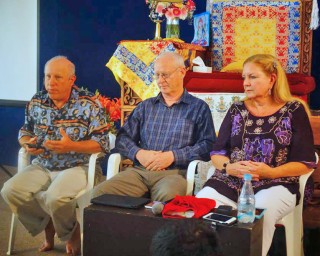
Karuna Cayton, Jhampa Shaneman and Jacie Keeley sharing stories, Mexico, September 2015. Photo by Nancy Torres.
Long-time students Karuna Cayton, Jhampa Shaneman and Jacie Keeley also shared some of their stories about studying and working with Lama Yeshe.
During the retreat, FPMT Mexico offered the translation of Rinpoche’s 2008 lam-rim teachings – Tu mente crea tu realidad. The book was edited by Alejandra Almada and Ven. Paloma, and published by Ediciones Dharma. Those precious teachings are also available in English at Lama Yeshe Wisdom Archive.
FPMT Mexico centers and study groups had a meeting with Rinpoche at the end of the retreat. After more that eight years of a great learning process, the Mexican mandala offered Rinpoche a constitution for a legal civil association. Rinpoche shared some advice with the directors, coordinators and SPCs, who committed to offer service with bodhichitta.
FPMT Mexico comprises four centers (Khamlungpa in Guadalajara, Bengungyal in Aguascalientes, Rinchen Zangpo in Torreón, Yeshe Gyaltsen in Cozumel) and five study groups (Padmasambhava in Durango, Vajrapani in Huatulco, Khedrup Sangye Yeshe in Morelia, Chekawa in Uruapan and Thubten Kunkyab in Mexico City). New groups will be formalized in Salamanca and Veracruz, and some upcoming groups will be developed in Puebla, Puerto Vallarta and San Luis Potosí.
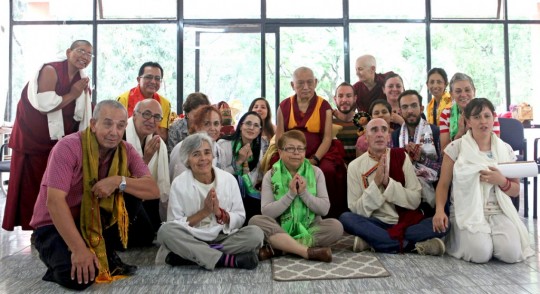
Lama Zopa Rinpoche with the directors and SPCs of the four FPMT centers and five FPMT study groups of Mexico, and also Ven. Paloma Alba from Spain, Guadalajara, Mexico, September 2015. Photo by Ven. Lobsang Sherab.
Video recordings of Rinpoche teaching at the “Essence of Nectar” retreat will be made available as soon as possible on FPMT.org’s “Rinpoche Available Now” page.
Learn more about Lama Zopa Rinpoche, spiritual director of the Foundation for the Preservation of Mahayana Tradition (FPMT), and Rinpoche’s vision for a better world. Sign up to receive news and updates.
- Tagged: fpmt mexico, karla ambrosio, khamlungpa center, lama zopa rinpoche, mexico
- 0
29
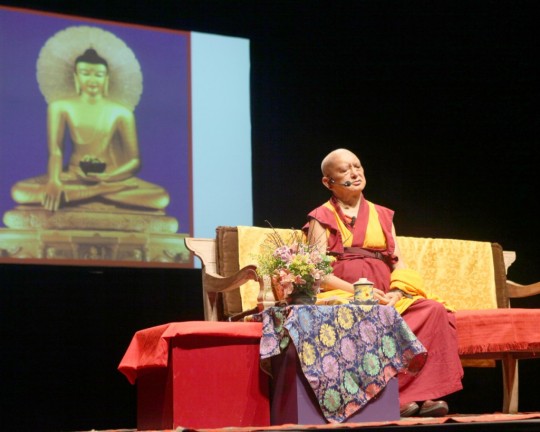
Lama Zopa Rinpoche giving a public teaching organized by Centro Shiwa Lha, Rio de Janeiro, Brazil, September 2015. Photo by Ven. Lobsang Sherab.
“Anybody who wants peace in the world should read the Golden Light Sutra,” Lama Zopa Rinpoche teaches. “This is a very important practice to stop violence and wars in the world. The Golden Light Sutra is one of the most beneficial ways to bring peace. This is something that everyone can do, no matter how busy you are, even if you can read one page a day, or a few lines and in this way continually read the Golden Light Sutra.
“The holy Golden Light Sutra is the king of the sutras. It is extremely powerful and fulfills all one’s wishes, as well as bringing peace and happiness for all sentient beings, up to enlightenment. It is also extremely powerful for world peace, for your own protection and for the protection of the country and the world. Also, it has great healing power for people in the country.
“For anyone who desires peace for themselves and for others this is the spiritual, or Dharma, way to bring peace that doesn’t require you to harm others, doesn’t require you to criticize others or even to demonstrate against others, yet can accomplish peace. Anyone can read this text, Buddhists and even non-Buddhists who desire world peace.
“This also protects individuals and the country from what are labeled natural disasters of the wind element, fire element, earth element and water element, such as earthquakes, floods, cyclones, fires, tornadoes, etc. They are not natural because they come from causes and conditions that make dangers happen. They come from past inner negative thoughts and actions of people, and from external conditions. …”
You can read Rinpoche’s complete advice on reciting the Golden Light Sutra for world peace on FPMT.org, where FPMT Education Services has created a Golden Light Sutra resource page. On this page you can find links to more advice; videos of Rinpoche giving the oral transmission of this precious sutra; and PDFs of the sutra in 14 languages: https://fpmt.org/education/prayers-and-practice-materials/sutras/golden-light-sutra/.
More information, photos and updates about FPMT spiritual director Lama Zopa Rinpoche can be found on Rinpoche’s webpage. If you’d like to receive news of Lama Zopa Rinpoche and FPMT via email, sign up to FPMT News.
- Tagged: golden light sutra, lama zopa rinpoche
- 0
28
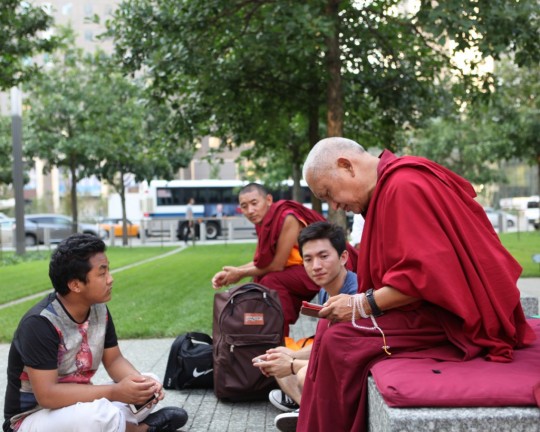
Lama Zopa Rinpoche doing prayers at the 9/11 Memorial in New York City, US, September 2015. Photo by Ven. Lobsang Sherab.
“Actually, there’s no outside enemy. There’s a reason why people give harm to us, get angry with us or criticize us. There’s a reason, there’s a cause for that, and that cause is our mind,” Lama Zopa Rinpoche taught at Kopan Monastery in December 2008. “For anybody, in any situation, even if a mosquito is biting us, the cause is our mind – attachment, anger, and of course no question about the root, ignorance. There’s no question, that’s the root. Ignorance – the concept holding things, the I and the aggregates as truly existent, which means the self-cherishing thought – that’s the real root.
“In the past we harmed others with these negative thoughts. We made mistakes, we did unrighteous actions and harmed others. What is happening now is the result of that. This mosquito biting us, that person who doesn’t like us even from the first time he saw us, that person who scolds us, even that unknown person who gets angry at us though we’ve never met before – all these things are just results, just creations of this mind. They are caused by this mind, by these negative thoughts, especially the self-cherishing thought.
“Actually, all these things are just like tools used by the people who are angry at us or who criticize us. All these things are like tools. The real enemy is our own self-cherishing thought, this ego, this ignorance, which causes anger, attachment and these delusions. The other things are like tools, like the stick that an angry person beats us with. The real reason is our own negative thought.
“It is very helpful to remember this when somebody is angry with us, scolding us or talking about our mistakes. If we can remember this at that time; that the situation is a tool, used by these negative thoughts. This is happening now because in the past we harmed that person, we did some wrong action to that person. The harm they are doing now is just a tool. The main enemy is our own negative mind. …”
Read the complete teaching “Don’t Get Angry at the Stick” on the Lama Yeshe Wisdom Archive: https://lamayeshe.com/article/dont-get-angry-stick/.
Learn more about Lama Zopa Rinpoche, spiritual director of the Foundation for the Preservation of Mahayana Tradition (FPMT), and Rinpoche’s vision for a better world. Sign up to receive news and updates. Visit https://fpmt.org/.
- Tagged: karma, lama yeshe wisdom archive, lama zopa rinpoche
- 0
25
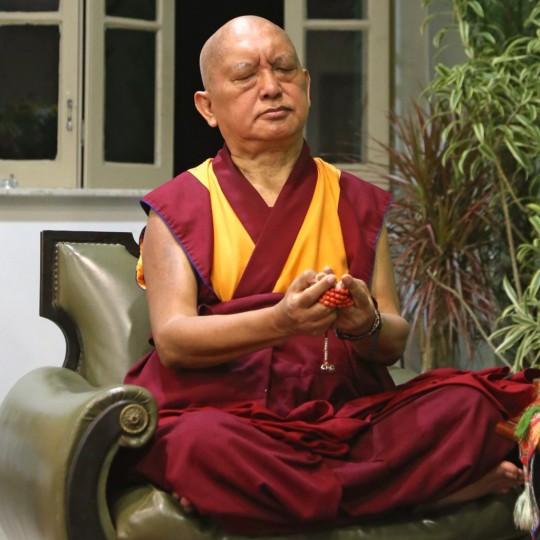
Lama Zopa Rinpoche offering a mandala during tsog puja, Rio de Janeiro, Brazil, September 2015. Photo by Ven. Roger Kunsang.
“The very highest meaning of tsog is to join method and wisdom,” Lama Zopa Rinpoche said about the tsog ceremony in the advice “Tsog Offering Practice” on the Lama Yeshe Wisdom Archive. “The real meaning of experiencing tsog is the transcendental wisdom, non-dual great bliss – the wisdom of emptiness, the non-duality of that, and uniting these two. That is the very essence of tsog. It is the offering of that experience, oneself experiencing it, the male and female heroes and heroines, of which the essence is the guru deity, and oneself also experiencing that, as the guru deity. The real meaning of tsog is integrating method and wisdom, the transcendental wisdom, non-dual bliss and voidness (this is the secret meaning).
“The need for the actual tsog substances is to develop the very heart of the Mahayana and tantric path, that brings enlightenment in one brief lifetime of these degenerate times, because it ceases the defilements quickly, including the actual negative imprints left on the mental continuum by the delusions, and is the quickest way to collect extensive merit, which takes three countless great eons on the paramita path to collect to achieve enlightenment. Here, in a brief lifetime of these degenerate times, using the transcendental wisdom of non-dual bliss and voidness to increase this, one needs to enjoy these tsog substances.
“This is the principal method of the circle of tsog, to gain general attainments, and it is the principal method to restore samaya, tantric vows, pacify obstacles, and is the main cause for achieving Heruka and Vajrayogini’s pure land – Tharpo Kachoe (Pure Sky Enjoyment). This is the principal cause to be born there. Therefore, one should practice offering tsog. …”
You can read the more extensive commentary by Rinpoche in “Tsog Offering Practice” on the Lama Yeshe Wisdom Archive: https://lamayeshe.com/advice/tsog-offering-practice/.
Lama Zopa Rinpoche is the spiritual director of the Foundation for the Preservation of Mahayana Tradition (FPMT), a Tibetan Buddhist organization dedicated to the transmission of the Mahayana Buddhist tradition and values worldwide through teaching, meditation and community service.
- Tagged: lama yeshe wisdom archive, lama zopa rinpoche, tsog
- 0
24
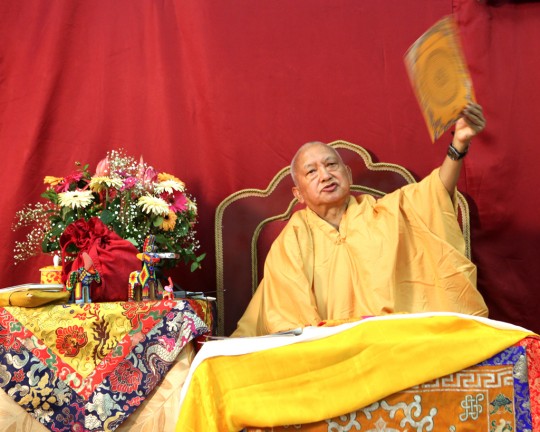
Lama Zopa Rinpoche at the end of the weekend lam-rim retreat in Colombia, September 2015. Photo by Ven. Lobsang Sherab. Rinpoche is wearing a traditional Colombian-style teaching robe offered to him by students.
Lama Zopa Rinpoche arrived in Brazil earlier this week after concluding a weekend lam-rim retreat in Colombia, organized by Centro Yamantaka.
Rinpoche will be teaching in Rio de Janeiro, Brazil, giving a public talk on September 25 and leading a lam-rim retreat September 26-27. Both events are being organized by Centro Shiwa Lha. For details on the event, visit http://www.lamazopabrasil.org/.
You can watch a live webcast of the teachings at the links below.
Public talk “Compassion in a Hostile World,” September 25, 7:30-9:30 p.m. local time (UTC-3), in English:
http://livestream.com/FPMT/BR2015
Public talk “Compassion in a Hostile World,” September 25, 7:30-9:30 p.m. local time (UTC-3), in Portuguese (organized by Centro Shiwa Lha):
https://www.youtube.com/watch?v=A2qjsaD9mM0
Lam-rim Retreat, September 26-27, in English:
http://livestream.com/FPMT/BR2015
Lam-rim Retreat, September 26-27, in Portuguese (organized by Centro Shiwa Lha):
https://www.youtube.com/watch?v=My6x-eOxDMU
High quality video recordings of Rinpoche’s teachings in Colombia and Brazil will be made available as quickly as possible on FPMT’s Rinpoche Available Now page.
Learn more about Lama Zopa Rinpoche, spiritual director of the Foundation for the Preservation of Mahayana Tradition (FPMT), and Rinpoche’s vision for a better world. Sign up to receive news and updates.
- Tagged: centro shiwa lha, centro yamantaka, lama zopa rinpoche
- 0
23
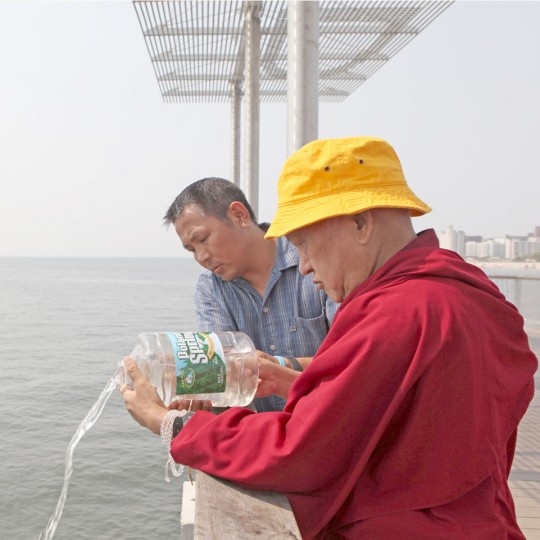
Lama Zopa Rinpoche blessing the Atlantic Ocean and all the creatures in it. A Sherpa ex-monk who has climbed Mount Everest five times assists Rinpoche, New York, US, September 2015. Photo by Ven. Losang Sherab. Rinpoche recited many mani mantras and blessed the bottles of water, which he then poured into the bay.
“The meditation on bodhichitta that you said you are doing is the best practice, that makes you achieve all the realizations and attain enlightenment in the quickest way,” Lama Zopa Rinpoche wrote to a student who had written to thank Rinpoche for bringing him so much happiness through his publications. “It is also the quickest way to free the sentient beings from the oceans of samsaric suffering and bring them to full enlightenment. Especially if you are doing the practice of bodhichitta with tong-len – taking numberless sentient beings’ suffering and the causes of suffering into your heart, onto yourself, and destroying the self-cherishing thought as well as the ignorance, the root of your samsara, the oceans of suffering of samsara. The real I, which is the false I, which is like a dream, like a hallucination, an illusion – like thinking the reflection of your face in the mirror or on the ocean is a real face – that is destroyed, that is realized to be empty, as it is empty. So you can do a short meditation on emptiness like this. Meditate on shunyata, emptiness only.
“When you take the sufferings of others, do so with compassion. When you dedicate to others, your body is in the form of numberless wish-granting jewels and all sentient beings receive whatever they want from that, and they achieve the dharmakaya and rupakaya. Dedicate all your enjoyments and all your belongings to the numberless six realm sentient beings, so they receive everything they want and achieve the dharmakaya and rupakaya. Then you dedicate all your past, present and future merits and their results, as well as all the good things in this life and in your next rebirth. Dedicate all the enjoyments in good rebirths from life to life, then the everlasting happiness of nirvana, and next, the ultimate happiness, the peerless happiness, the total cessation of all the obscurations and completion of all the realizations. So you dedicate all of this to numberless hell beings, numberless hungry ghosts, numberless animals, numberless human beings, numberless asuras, numberless suras and numberless intermediate state beings. And from that they achieve everything, the dharmakaya and rupakaya.
“When you take the suffering and its causes – wow, wow, wow, wow, wow, wow – this is the most powerful purification. Negative karmas and obscurations collected from beginningless rebirths are purified. It is most amazing, most amazing, most amazing, most amazing, most amazing! …”
Read the rest of Rinpoche’s letter with advice on tong-len practice on the Lama Yeshe Wisdom Archive: https://lamayeshe.com/advice/tong-len-practice.
Lama Zopa Rinpoche is the spiritual director of the Foundation for the Preservation of Mahayana Tradition (FPMT), a Tibetan Buddhist organization dedicated to the transmission of the Mahayana Buddhist tradition and values worldwide through teaching, meditation and community service.
- Tagged: lama yeshe wisdom archive, lama zopa rinpoche, tong-len
- 0
- Home
- News/Media
- Study & Practice
- About FPMT Education Services
- Latest News
- Programs
- New to Buddhism?
- Buddhist Mind Science: Activating Your Potential
- Heart Advice for Death and Dying
- Discovering Buddhism
- Living in the Path
- Exploring Buddhism
- FPMT Basic Program
- FPMT Masters Program
- FPMT In-Depth Meditation Training
- Maitripa College
- Lotsawa Rinchen Zangpo Translator Program
- Universal Education for Compassion & Wisdom
- Online Learning Center
- Prayers & Practice Materials
- Overview of Prayers & Practices
- Full Catalogue of Prayers & Practice Materials
- Explore Popular Topics
- Benefiting Animals
- Chenrezig Resources
- Death & Dying Resources
- Lama Chopa (Guru Puja)
- Lama Zopa Rinpoche: Compendium of Precious Instructions
- Lama Zopa Rinpoche: Life Practice Advice
- Lama Zopa Rinpoche Practice Series
- Lamrim Resources
- Mantras
- Prayer Book Updates
- Purification Practices
- Sutras
- Thought Transformation (Lojong)
- Audio Materials
- Dharma Dates – Tibetan Calendar
- Translation Services
- Publishing Services
- Teachings and Advice
- Find Teachings and Advice
- Lama Zopa Rinpoche Advice Page
- Lama Zopa Rinpoche: Compendium of Precious Instructions
- Lama Zopa Rinpoche Video Teachings
- ༧སྐྱབས་རྗེ་བཟོད་པ་རིན་པོ་ཆེ་མཆོག་ནས་སྩལ་བའི་བཀའ་སློབ་བརྙན་འཕྲིན།
- Podcasts
- Lama Yeshe Wisdom Archive
- Buddhism FAQ
- Dharma for Young People
- Resources on Holy Objects
- Ways to Offer Support
- Centers
- Affiliates Area
- Teachers
- Projects
- Charitable Projects
- Make a Donation
- Applying for Grants
- News about Projects
- Other Projects within FPMT
- Support International Office
- Projects Photo Galleries
- Give Where Most Needed
- FPMT
- Shop
Translate*
*powered by Google TranslateTranslation of pages on fpmt.org is performed by Google Translate, a third party service which FPMT has no control over. The service provides automated computer translations that are only an approximation of the websites' original content. The translations should not be considered exact and only used as a rough guide.Our problem is that inside us there’s a mind going, ‘Impossible, impossible, impossible. I can’t, I can’t, I can’t.’ We have to banish that mind from this solar system. Anything is possible; everything is possible. Sometimes you feel that your dreams are impossible, but they’re not. Human beings have great potential; they can do anything. The power of the mind is incredible, limitless.
Manjushri Institute, 1977, Currently unpublished
Lama Yeshe Wisdom Archive







